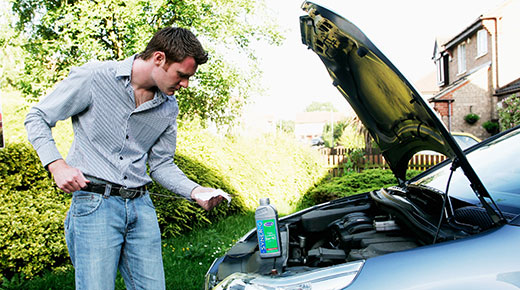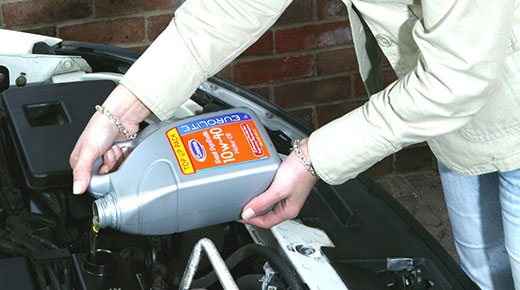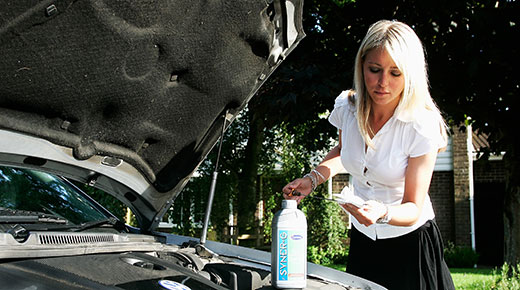
Why not putting oil in your engine can actually be a slippery slope
The role oil plays in your car’s engine is vitally important, and not keeping an eye on your motor’s oil levels – as well as regularly changing the stuff at the prescribed intervals – can cause excess wear and even engine failure.
Just like your bones need cartilage to freely move, your engine needs oil to do the same thing.
When you start your engine, the oil pump primes and squirts the fluid to all corners of the machine. This creates a thin film of fluid between metallic parts, lubricating the moving components and protecting your engine against damage.
But if you don’t keep your oil level topped up and the volume in the sump (the holding place for your engine’s oil) decreases, it could spell disaster.
Going back to the bare bones – literally – when your cartilage breaks down, you’ve got bone moving against bone, causing some nasty vibrations and serious damage. The same is true of an engine.
Oil also helps keep some moving parts cool. Without it, the friction created by the bare metallic items moving against each other causes heat. It can get so hot, in fact, that your engine can effectively ‘weld’ itself together as a result of the temperatures, seizing solid at great cost.

Even with the correct amount of oil in your engine, it still needs to be changed regularly. The speeds at which parts are thrashing about means tiny metallic fragments are shaved away from components at certain points – completely natural, but the debris can only go to one place.
It sits in suspension in the oil, and acts as an abrasive substance, potentially causing needless damage. Your car’s oil filter has to remove this from the oil, so both need changing regularly to avoid any harm. Consult your vehicle’s service book to find out how frequently your oil and oil filter should be changed.
In between oil changes, keep an eye on oil level, as a slow but steady drop can signify a leak somewhere, or that your engine is burning too much of the stuff.
Check the level by warming the car through gently for five minutes. Then park it on a level surface and turn it off, leaving for a few minutes to let the warm oil drain back into the sump.
Remove the dipstick and clean it off before putting it back into the dipstick tube. This gets rid of any error in the reading that could have been caused by oil splashing around.

Finally, pull the dipstick back out and note where the oil comes to on the scale. There should be ‘Min’ and ‘Max’ marking. If the level is close to the minimum, top up with the right grade oil – again, find this out by consulting the handbook.
Don’t overfill it though, as this can also be bad news, creating too much pressure in your engine under use and rupturing important seals.
For a few moments spent performing routine checks every month, such as analysing your engine’s oil level, it could save you money on costly repairs – or even a replacement engine.
Got a spare five minutes this weekend? Why not give it a go? Just as with our other guides on topping up brake fluid and coolant, you oil is just as important for a happy running car.
Have you had an oil-related run-in in your car, or know someone who has? How often do you change your oil and oil filter? Why not share your experiences with other T W White & Sons readers. We want to hear from you below. Alternatively, Tweet us @twwhiteandsons or let us know on our Facebook page – just search for twwhiteandsons.
Similar Articles
Car Finance Explained – How Does Car Finance Work?
Investing in a new car is a big decision, so you want to ensure that you pick the purchase or finance option that’s right for you. You can buy a vehicle outright, but most people tend to opt for one of the finance options available. Car finance allows you to spread the cost of the […]
Buyers guide to pre-registered cars
While buying a brand new car might be alluring, and being the first driver registered to the car certainly has its benefits, it’s not necessarily the right choice for you. Before you make you decide, read our guide to pre-registered vehicles to see if it’s the best option for your needs. When it’s time to […]
The truth about average speed cameras
Dispelling the myths and misconceptions surrounding average speed cameras, we get down to the truth of how they work and how you can avoid getting fined. While we can all understand the need to monitor speeds from a safety perspective, no one like seeing the yellow of a speed camera in the road ahead. With […]